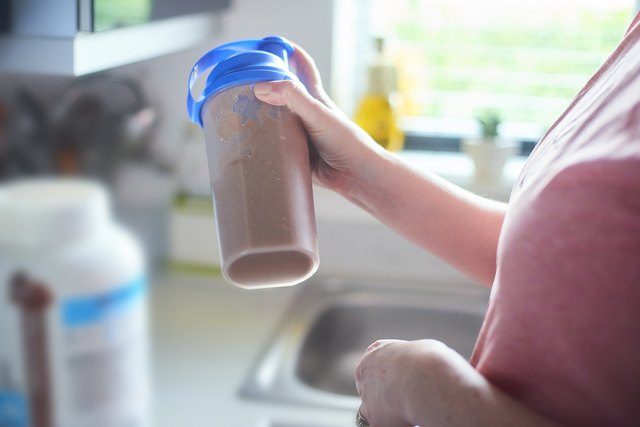Protein helps you feel full, builds muscle, and fuels workouts—all useful for shedding pounds! Adding protein powder to your diet can support weight loss success. But with so many protein products out there, how do you pick the best ones to drop weight? This post shares the science behind using protein supplements to lose pounds faster and keep them off. Learn how much protein powder per day aids weight control. Discover the weight loss difference between powders like whey, casein, and more.

Contents
- 1 Is Protein Powder Good For Weight Loss?
- 1.1 1. Protein Boost:
- 1.2 2. Muscle Preservation:
- 1.3 3. Metabolic Boost:
- 1.4 4. Convenient Option:
- 1.5 5. Meal Replacement:
- 1.6 6. Hunger Control:
- 1.7 7. Enhanced Exercise:
- 1.8 8. Reduced Carbohydrate Intake:
- 1.9 9. Increased Satiety:
- 1.10 10. Improved Fat Loss:
- 1.11 11. Supports a Balanced Diet:
- 1.12 12. Variety of Flavors:
- 1.13 13. Portion Control:
- 1.14 14. Sustained Energy:
- 1.15 15. Versatility:
- 2 Potential Risks and Side Effects of Protein Powder
- 3 Frequently Asked Questions
Is Protein Powder Good For Weight Loss?
Here are a few key points about whether protein powder can be helpful for weight loss:
1. Protein Boost:
Protein powder is a concentrated source of protein, which can help curb hunger and increase feelings of fullness, reducing overall calorie intake.
2. Muscle Preservation:
During weight loss, protein powder can help preserve lean muscle mass, preventing muscle loss often associated with calorie restriction.
3. Metabolic Boost:
Protein has a higher thermic effect, meaning it burns more calories during digestion, potentially boosting metabolism.
4. Convenient Option:
Protein powder offers a convenient way to increase protein intake without the need for extensive meal preparation.
5. Meal Replacement:
Protein shakes can serve as meal replacements, controlling calorie intake while providing essential nutrients.

6. Hunger Control:
Consuming protein powder between meals can help control hunger and reduce the likelihood of unhealthy snacking.
7. Enhanced Exercise:
Protein powder can aid in muscle recovery and growth, supporting more effective workouts for weight loss.
8. Reduced Carbohydrate Intake:
High-protein shakes may lead to lower carbohydrate consumption, helping stabilize blood sugar levels.
9. Increased Satiety:
The satiating effect of protein can help you stick to your diet and avoid overeating.
10. Improved Fat Loss:
Protein may enhance fat loss by increasing the sensation of fullness, leading to fewer overall calories consumed.
11. Supports a Balanced Diet:
Protein powder can be part of a balanced diet, promoting overall health while aiding weight loss.
12. Variety of Flavors:
A wide range of flavors allows for enjoyable protein shakes, making it easier to adhere to a weight loss plan.
13. Portion Control:
Protein powder servings are pre-measured, aiding portion control and calorie management.
14. Sustained Energy:
Protein shakes provide lasting energy, reducing the temptation to consume high-calorie snacks.
15. Versatility:
Protein powder can be used in various recipes, from smoothies to baked goods, making it adaptable to your dietary preferences.
Potential Risks and Side Effects of Protein Powder
As mentioned previously, while protein powder can be a helpful tool, it’s crucial to be aware of potential risks and side effects:

1. Digestive issues:
- Lactose intolerance: Whey and casein protein powders are derived from milk and contain lactose. If you’re lactose intolerant, these can cause bloating, gas, diarrhea, and stomach cramps. Opt for plant-based or lactose-free whey protein isolate in such cases.
- Fiber deficiency: Some protein powders lack fiber, essential for digestion. This can lead to constipation, especially if you don’t consume enough fiber-rich foods. Choose powders with added fiber or include fruits and vegetables in your protein shakes.
2. Nutrient deficiencies:
- Overreliance on protein powder: Replacing whole meals with protein shakes can lead to deficiencies in other essential nutrients like vitamins, minerals, and healthy fats. Ensure you still consume a balanced diet rich in various food groups.
3. Kidney strain:
- Excess protein intake: Consuming excessively high amounts of protein (more than 2 grams per kg of body weight daily) can put strain on your kidneys, especially if you have pre-existing kidney issues. Consult a doctor or dietitian for personalized recommendations.
4. Other potential risks:
- Allergic reactions: People with milk allergies might react to whey or casein protein. Be cautious and choose alternative protein sources if needed.
- Contaminants: Some protein powders might contain trace amounts of heavy metals, pesticides, or other contaminants. Choose reputable brands with third-party lab testing certifications.
- Hormonal disruption: Soy protein powders may contain phytoestrogens, which might disrupt hormonal balance in sensitive individuals. Consider other options if concerned.
Frequently Asked Questions
What are the potential side effects of protein powder?
Excess intake of protein powder can lead to increased bowel movements, bloating, and nausea. It can also cause flatulence, diarrhea, and weight gain if consumed in excess quantities.
Can I drink protein shakes without working out?
Yes, you can drink protein shakes on rest days or when doing less physical activity without adverse effects. However, if you consume high protein shakes solely for their own sake, it may cause weight gain.
Can protein powder help in losing belly fat?
Protein shakes alone cannot specifically target belly fat loss. However, incorporating them into a balanced diet and exercise routine can support overall weight loss, including in the stomach area.
Should I take protein powder for weight loss?
Protein is an essential nutrient for weight loss, as it can boost metabolism and reduce appetite. Protein shakes provide a convenient way to increase protein intake during weight loss efforts.

Hello, I’m Ravindra. Over the years, I’ve immersed myself deeply into the world of fitness and health, transforming both my body and mind. Writing has allowed me to share my journey, insights, and expertise with those just starting out and seasoned fitness enthusiasts alike. Beyond just routines and diets, I believe in inspiring others to adopt a holistic approach to well-being.
